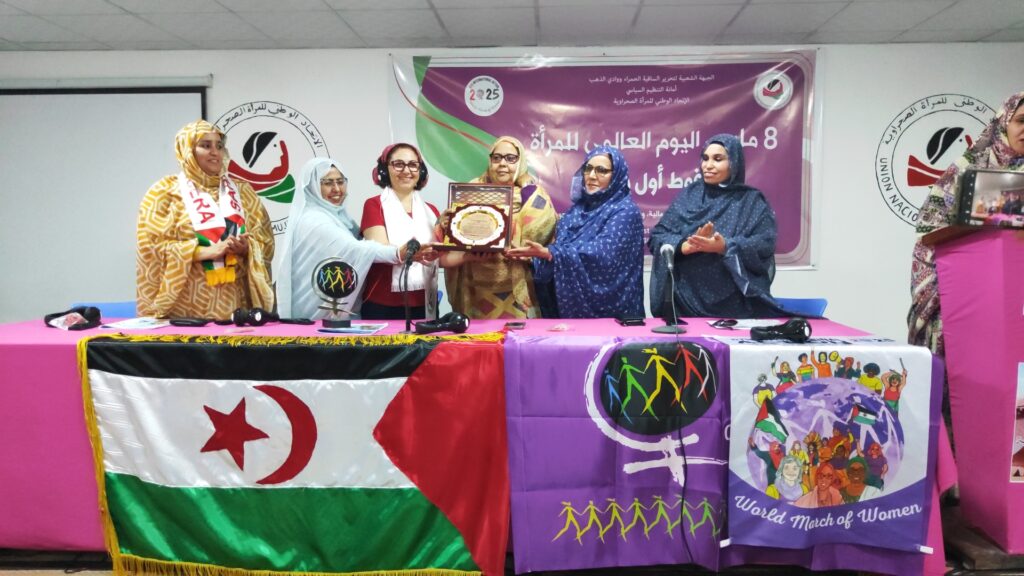6th International Action of the World March of Women Begins in Western Sahara
Western Sahara, March 2025 – The 6th International Action of the World March of Women (WMW) has officially kicked off in Western Sahara, bringing together feminist activists from across the globe. This powerful movement, which has struggled for women’s rights and equality for all since its inception in 2000, continues to mobilize and stand in solidarity with women in occupied territories, conflict zones, and oppressed communities worldwide.
A Symbolic Start in Western Sahara

The decision to launch the 6th International Action in Western Sahara is deeply significant. As one of the last remaining colonies in Africa, Western Sahara has long been the site of political conflict and struggle for self-determination. Women in the region face systemic discrimination, violence, and economic hardship, exacerbated by the ongoing occupation and geopolitical tensions. The WMW’s presence aims to amplify their voices and highlight the intersection of women’s rights, anti-colonial resistance, and global solidarity.

Read speech delivered and published by Capire at the launch of the 6th International Action of the World March of Women in Western Sahara:
Read the Yıldız Temürtürkan speech
Launch and Activities of the 6th International Action in Tindouf and Algeria
The launch of the 6th International Action took place from March 8 to March 11, 2025, in Tindouf, with a series of symbolic and strategic activities. The event opened at the National Union of Sahrawi Women’s main office, where attendees visited a traditional tent and a media exhibition before joining in the chant of the anthem Fire and Determination. Key speeches were delivered by the General Secretary of the National Union of Sahrawi Women and the International Secretariat of the World March of Women, emphasizing the intersection of the feminist struggle with the Sahrawi people’s fight for self-determination. A documentary showcased the history of suffering endured by the Sahrawi people during the conflict, followed by a discussion on the health conditions of the population through a gender and intersectionality lens.

The second day, March 9, included visits to the National Museum, where WMW members joined a demonstration, and meetings with the President of the Sahrawi Red Crescent and representatives of families of disappeared detainees. Delegates also toured the Al Bachir Salah National Hospital to understand the healthcare struggles in the occupied territories. The evening concluded with a roundtable discussion and a cultural event celebrating Sahrawi resistance.
On March 10, participants traveled to Aousserd Province, where they were received by local authorities and given a guided tour. A visit to the Simone Bolivar School provided insight into the challenges faced by Sahrawi youth in education. Later, attendees visited a cinema venue in Boujdour, emphasizing the role of culture in the feminist and liberation struggle.
The activities continued in Algeria on March 11, where participants arrived in Algiers and were welcomed with a film screening and discussion on feminist resistance in occupied territories. A conference titled The Struggles of Sahrawi Women provided a platform for speakers to reflect on the resilience and determination of women in Western Sahara. The day ended with a traditional tea gathering, allowing for feminist exchanges and networking among participants.

Since the creation of the National Union of Saharawi Women (UNFS) in 1974, their efforts have been essential in the mobilization for national independence and the emancipation of women. With its 10,000 members, UNFS has played a decisive role in improving the representation of Sahrawi women within the Polisario Front and the Saharawi Arab Democratic Republic.
- Learn more about Western Sahara by reading this document:
The Cause, The History, The Women : Western Sahara
- Watch the video about Western Sahara prepared by WMW and Capire:
A Flag in the Sand: Sahrawi Women Building Sovereignty
The 6th International Action is not just a moment—it is a movement that fuels change, sustains resistance, and envisions a world where women’s rights and sovereignty are at the heart of global justice.

Themes and Goals of the 6th International Action
From March 8 to October 17, the World March of Women calls all sisters worldwide to march together under the slogan:
“We March Against Wars and Capitalism, We Defend the Sovereignty of Peoples and Buen Vivir!”
The 6th International Action focuses on:
- Defending commons against transnational corporations
- Feminist economy based on sustainability of life and food sovereignty
- End of violence against women, autonomy over bodies and sexuality
- Peace and demilitarization
Building International Grassroots Feminism
The World March of Women reaffirms its commitment to feminist action that challenges patriarchy, capitalism, and all forms of oppression. As the movement continues its journey beyond Western Sahara, the spirit of collective struggle and resistance will echo across continents, inspiring women everywhere to fight for justice, peace, and equality.
Together, WMW affirms its commitment to supporting the struggle of Saharawi women and to working for a world free from oppression, capitalism, and patriarchy.
Long live international solidarity!
Long live the struggle of Saharawi women!
We March Against Wars and Capitalism, We Defend the Sovereignty of Peoples and Buen Vivir!

